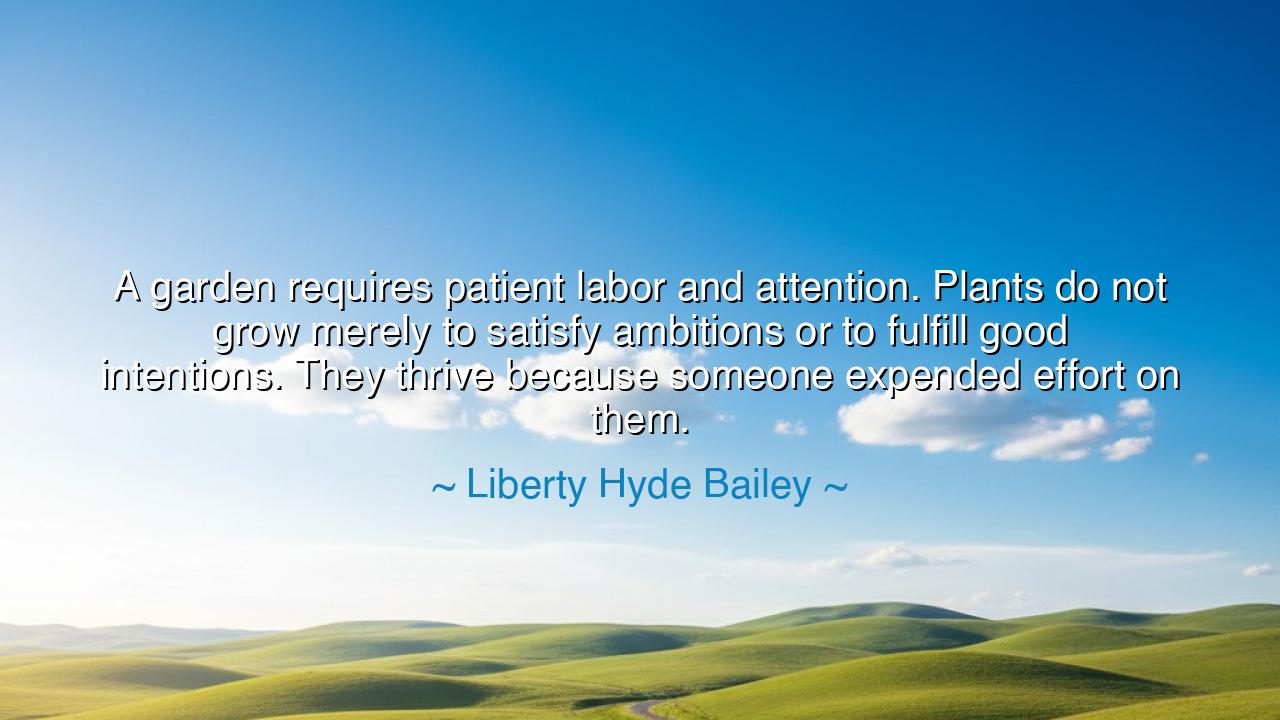
A garden requires patient labor and attention. Plants do not grow
A garden requires patient labor and attention. Plants do not grow merely to satisfy ambitions or to fulfill good intentions. They thrive because someone expended effort on them.






The American horticulturist Liberty Hyde Bailey, often called the father of modern horticulture, once wrote: “A garden requires patient labor and attention. Plants do not grow merely to satisfy ambitions or to fulfill good intentions. They thrive because someone expended effort on them.” These words, born from the soil itself, are not merely about gardening—they are about the law of creation, the sacred rhythm that governs all growth, whether of plants, dreams, or the human spirit. Bailey reminds us that good intentions are but seeds cast upon the ground; without patient labor, they remain lifeless. The garden of life answers not to desire, but to devotion.
The origin of this truth lies deep in nature’s ancient design. The earth does not reward the dreamer who admires her from afar; she blesses the one who kneels before her, hands in the dirt, tending, watering, and waiting. Patience and effort are her commandments. The farmer who rises before dawn to work his land knows this creed by heart: growth cannot be rushed. Just as no amount of wishing can bring the sun before its time, no amount of ambition can substitute for steady, faithful work. The seed grows not because we hope it will, but because we have prepared the soil and cared for it through storm and drought.
The same is true of the soul. Many speak of greatness, of virtue, of wisdom—but these do not bloom in the heart that merely wishes for them. They must be cultivated through discipline, consistency, and sacrifice. Bailey’s words are a rebuke to the age of instant desire, to those who mistake intention for achievement. Just as the plant withers without tending, so too does character fade when fed only by empty aspirations. To build anything enduring—whether a family, a craft, or a purpose—one must commit to the long, quiet work that nourishes unseen roots.
A shining example of this truth is found in the life of George Washington Carver, the humble scientist who transformed Southern agriculture. Born into slavery, he rose not through ambition alone, but through unceasing labor and patience. Day after day, he worked with the soil, experimenting with peanuts and sweet potatoes, teaching poor farmers to heal the land. His vision was not fulfilled by dream or talk—it was fulfilled by hands that refused to rest. Like Bailey’s gardener, Carver understood that growth is not a matter of luck or intellect, but of love applied through toil. His work fed millions, not because he sought glory, but because he gave his life to the slow rhythm of creation.
There is a deep moral beauty in this teaching. The garden becomes a mirror of our lives: what we tend with care will flourish; what we neglect will perish. Many wish for peace, yet sow no forgiveness. Many wish for prosperity, yet shun discipline. Many wish for love, yet do not labor to understand. Bailey reminds us that life is a garden of effort, not of entitlement. Every blossom of joy, every fruit of success, is the harvest of someone’s unseen diligence.
And yet, this labor is not grim. There is sacred joy in the tending, in knowing that each act of care participates in creation itself. The gardener does not demand the flower to bloom—he serves it, trusting in the process. So too must we labor with faithful patience, understanding that time and effort are divine partners. The world’s most enduring beauty comes not from haste, but from harmony between purpose and persistence.
The lesson, then, is both simple and eternal: growth is earned, not granted. No life flourishes by wish alone. The true gardener of destiny must rise each day and work—water the soil of his dreams, pull the weeds of distraction, endure the seasons of failure. In time, the blossoms will come. But they come only to those who have loved enough to labor.
So let us remember Bailey’s wisdom: every worthy thing requires patient effort. To build a garden, to raise a child, to shape a soul—each demands the same devotion. Sing if you must, dream if you will, but never forget to work with your hands in the earth. For in the end, it is the sweat upon your brow and the patience in your heart that make the garden of your life truly bloom.






AAdministratorAdministrator
Welcome, honored guests. Please leave a comment, we will respond soon